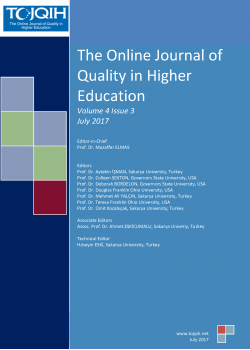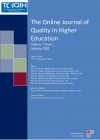TOJQIH - Volume 4 - Issue 3 - July 2017
 A STUDY ON SYNCHRONIZED CLASSROOM OF NATIONAL UNION OF NETWORKED TEACHER EDUCATION IN CHINA
A STUDY ON SYNCHRONIZED CLASSROOM OF NATIONAL UNION OF NETWORKED TEACHER EDUCATION IN CHINA Wenfeng Huang
Abstract:
Synchronized Classroom of National Union of Networked Teacher Education (NUNTE) is an online education
model which breaks through the barriers of relatively closed traditional university teaching methods and makes it
possible to share high-quality teacher education resources among universities in China. Under this new model,
unified standards for shared courses management, technical supports, and teaching resource services have been
set up, and the interscholastic curricula-selecting and the credit mutual-recognition are also accomplished. A
questionnaire survey by NUNTE shows that the students generally regard the Synchronized Classroom as a very
creative online education model and expect that it can be applied to more students by further improvement.
 INDICATORS FOR QUALITY IN HIGHER EDUCATION: COMPARISON BETWEEN PAKISTAN AND GERMANY
INDICATORS FOR QUALITY IN HIGHER EDUCATION: COMPARISON BETWEEN PAKISTAN AND GERMANY Mustafa Ghulam
Abstract:
There is a strong relationship between knowledge management, quality practice, indicators and quality in the
higher educational system. It would help to create the learning environment which would enhance the qualified
graduates, skilled persons, who facilitate their countries in its progress. It is needed to realize the importance of
knowledge management of quality indicators in Higher Education and its impact on the quality of Higher
Education. Knowledge management of quality indicators can be between institutes at national level and also
between the international institutions of developed and developing countries. Nevertheless, using only a few
indicators to evaluate universities in different countries and cultures seems not to be adequate, as not only the
institutions and cultures are diverse but so are the interests and demands of students, too. It will be a central
challenge for university rankings in the future to judge more differentiated and to respect different cultures and
traditions as well as local demands and different kinds of research.
 POSSIBILITY OF FOREIGN LANGUAGES IN THE EDUCATION SYSTEM OF AZERBAIJAN: ANALYSIS OF THE BEST FOREIGN LANGUAGE AMONG STUDENTS’ IN HIGHER PRIVATE EDUCATIONAL INSTITUTIONS
POSSIBILITY OF FOREIGN LANGUAGES IN THE EDUCATION SYSTEM OF AZERBAIJAN: ANALYSIS OF THE BEST FOREIGN LANGUAGE AMONG STUDENTS’ IN HIGHER PRIVATE EDUCATIONAL INSTITUTIONS Valida Karimova
Abstract:
The objective purpose of the present article examines the possibility of foreign languages in the education system of
Azerbaijan: which analyses and determining the most preferred foreign language for this matter. Azerbaijan is a
country with traditions of multilingualism.
This research was conducted using descriptive quantitative method involving 301 students from two private
Universities as participant. The instruments used for this research study are questionnaire to identify whether foreign
language is supported among students in Azerbaijan, and which foreign language is preferred most. Moreover, it
was sought to examine the relationship among variables of gender, social class, existing language skills, as well as
attitudes to the target language preference.
It was found that foreign language learning is supported by participants, and English is the most preferred foreign
language. It indicates that multilingual societies like Azerbaijan are supportive of language acquisition choices that
help preserve and develop multilingualism. Moreover, it was found that attitude to foreign language learning itself
differ due to income level and existing language skills.
 THE QUALITY IMPROVEMENT TOOLKIT
THE QUALITY IMPROVEMENT TOOLKIT Kevin Schoepp, Scott Benson
Abstract:
As the importance of demonstrating student learning within higher education has grown, institutions have
developed learning outcomes assessment programs to provide evidence of student learning. Further driven by
quality assurance requirements and accreditation mandates, institutions have started to develop systematic
assessment programs that include assessment structures, personnel, processes, and documentation. At Zayed
University the assessment program is based on an annual assessment cycle where colleges and departments are
asked to prepare assessment plans and reports, to collect and analyze assessment data, and to implement
improvements when necessary. To do this, faculty charged with learning assessment responsibilities require a
common set of resources or tools. Recognized as one of 10 inaugural Excellence in Assessment Designees, an
award sponsored by the National Institute for Learning Outcomes Assessment, Zayed University has developed
a series of templates, exemplars, rubrics and other resources to help facilitate effective assessment and ensure
quality in its assessment program. These documents comprise the Quality Improvement Toolkit (QIT). Drawing
on the performance improvement literature, and, in particular, Thomas Gilbert’s Behavior Engineering Model
(BEM) and its descendants, this paper introduces Zayed University’s QIT and illustrates its effectiveness in
helping to assure quality and promote effective assessment of student learning.
 THE STUDENT SATISFACTION AT THE CAMPUS: THE CASE OF SULEYMAN DEMIREL UNIVERSITY
THE STUDENT SATISFACTION AT THE CAMPUS: THE CASE OF SULEYMAN DEMIREL UNIVERSITY Devrim VURAL YILMAZ
Abstract:
Higher education has been witnessing rapid changes in recent years and universities have been perceived as
service providers beside their traditional roles. In this regard, concept of quality has also been transforming and
becoming a multidimensional area that comprises state, society, employers, academicians and students.Student
centered quality approach regards students as the main stakeholders in this process and emphasize that the
students should be the primary participants and beneficiaries of qulity improvement. In line with these
developments, studies regarding student participation in quality management have been increasing and service
quality of university facilities has begun to be measured. This study has also aimed at finding out assesments of
students on quality of learning and student support services in a state university in Turkey, namely Suleyman
Demirel University. To this end, findings of a survey held with students in 2016 are presented and discussed.


